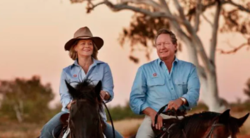
Nicola and Andrew Forrest on their family cattle property, Minderoo Station, in northern Western Australia.
Forrests outbid Indigenous group for WA cattle station
by Brad Thompson
Mining billionaire Andrew Forrest says conservation and heritage considerations must be balanced against the need for farming and job creation after confirming his purchase of a vast land holding nestled on Western Australia's Fitzroy River.
Dr Forrest's private holding company, Tattarang, outbid an Indigenous group for Jubilee Downs. He joins Gina Rinehart and Kerry Stokes as owners of big cattle stations in the Fitzroy Valley.
The $30 million purchase from American billionaire and environmentalist Edward Bass, and minority shareholders Keith and Karen Anderson, was revealed by The Australian Financial Review on Wednesday.
In a joint statement, Dr Forrest and his wife, Nicola, said they looked forward to working "with and for" the Yi-Martuwarra people, who came up short with a $25 million bid for Jubilee Downs and the incorporated Quanbun Downs station, which cover 220,000 hectares and have about 90 kilometres of Fitzroy River frontage.
“We recognise the Yi-Martuwarra have been the guardians of this sacred country for tens of thousands of years," the Forrests said. "We very much look forward to working with their local elders and communities to ensure access, and to preserve and protect significant and sacred sites.”
The Forrests said the need to protect WA's Kimberley region and the river shouldn't rule out sustainable agriculture and jobs for local communities. They intend to commission a baseline native fauna study at Jubilee Downs and build on the work of the Andersons, who are the long-term managers of the station and its herd of 11,000 cattle.
The Forrests also indicated they wanted to boost domestic beef production and help the northern cattle industry move away from live exports to Indonesia, Vietnam and other countries.
“The Andersons shared a strong belief that the Australian beef industry must add value throughout its supply chain, instead of just selling our live cattle for value-adding to overseas markets, a view which we share," they said. “We are passionate about the unique environment of the Kimberley, and the precious waterway and life force that is the Fitzroy River.
"We strongly believe in the principle of balancing the need for sustainable agriculture and job creation for local communities, with the need to preserve culture and heritage sites, while restoring the land and its original fauna to its natural habitat.”
Damages claim looming
Dr Forrest said he supported a recent decision by the WA government to rename the King Leopold Ranges in the Kimberley to the Wunaamin Miliwundi Ranges.
The ranges were named after the Belgian king – now notorious for his role in slavery – in 1879, by Dr Forrest's great-great-uncle, Alexander Forrest, who explored and surveyed much of the Kimberley.
“King Leopold’s legacy directly conflicts with the values of our Minderoo Foundation and our mission to end modern slavery through Walk Free,” Dr Forrest said. “This was the right decision and one my family and I fully support.”
Dr Forrest's Fortescue Metals Group is one of Australia's biggest employers of Indigenous people and contractors.
However, Fortescue is facing a billion-dollar-plus damages claim from traditional owners Yindjibarndi Aboriginal Corporation, after losing a series of court cases over its development of the Solomon iron ore mining hub in WA's Pilbara.
The Yindjibarndi claim Fortescue has destroyed hundreds of heritage sites with no valid agreement in place.
The Forrests said they were committed to Indigenous parity, including through Fortescue. They made no comment in their statement on the potential for irrigated agriculture over vast tracts of the Fitzroy Valley.
The CSIRO’s Northern Australia Water Resources Assessment from 2018 found there was huge scope for water capture and irrigated agriculture in the Fitzroy catchment, which covers about 94,000 square kilometres.
The WA government suspended talks about water allocation and management plans for the Fitzroy River in April because of COVID-19, but remains committed to creating a Fitzroy River National Park.
Mrs Rinehart, Mr Stokes and Dr Forrest's investments in Fitzroy Valley cattle stations over the past six years total more than $160 million. The Forrests now own six cattle stations in WA covering more than 1.5 million hectares.













